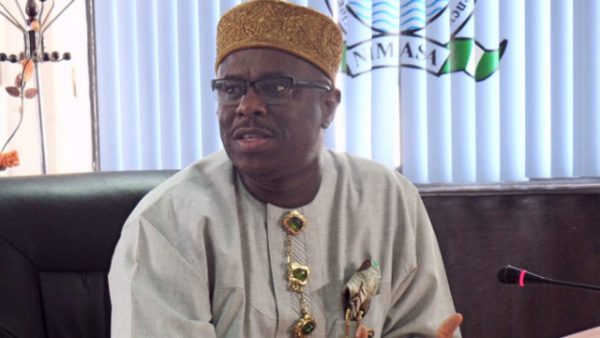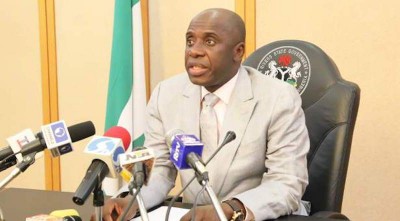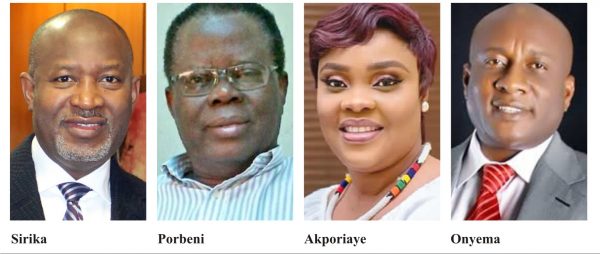2019 Transport Agencies Rating: How NSC, CRFFN, MAN Oron, NiMET Fared

By Kenneth Jukpor & Okuneye Moyosola
MMS Plus presents the scorecard of transport sector agencies based on their performance in the first half of 2018 with regards to their core functions. In this week’s appraisal, we x-ray; Nigerian Shippers’ Council (NSC), Council for the Regulation of Freight Forwarding in Nigeria (CRFFN), Maritime Academy of Nigeria (MAN) Oron and the Nigerian Meteorological Agency (NiMET).
For the grading system: A =90-100%, B+ = 80-89%, B =70-79%, C+ =60-69%, C =50-59%, D =40-49% and E = 30-39%, F = 0-30%. Enjoy it:
Nigerian Shippers Council (NSC)
For the purpose of this report, only the functions of the Nigerian Shippers’ Council as Port Economic Regulator would be analyzed. There are ten (10) functions and each carries 10points;
• Provide guidelines on tariff setting in order to guide against arbitrariness
In the year under reveiw, the Council was able to regulate tariffs, especially against arbitrary increment in charges. However, this success was only recorded at the seaports as the ground handling companies increased their charges by 40% in the last quarter of the year. The truck haulage fares also defied all efforts of the Council as the charges skyrocketed following the port access roads chaos.
Score = 6/10
• Monitor and enforce standards of service delivery to ensure availability, accessibility, affordability, stability, predictability and adequacy of services
Shippers’ Council was not able to negotiate or standardize freight rates for trucking, trains or carriage of goods via the waterways, despite holding several meetings with port stakeholders on this issue. Nevertheless, the Council was able to champion a bill to be known as Carriage of Goods by land and this bill is expected to address these challenges.
Score =4/10
• Encourage competition and guard against the abuse of monopoly and dominant market positions:
This role received more attention from the Council in 2019; with the Council striving to ensure a level playing field for all categories of stakeholders.
Score = 6/10
• Perform mediatory role among stakeholders;
The Council was able to perform the role of an intermediary and an unbiased umpire amongst the industry stakeholders. Operators have found solace in the Complaints unit at the Council and Consumer Affairs department was also in the spotlight managing disputes and protecting consumers of services.
Score = 7/10
• Establish accessible and modern dispute resolution mechanism
The Port Service Support Portal (PSSP) and Standards Operating Procedures (SOPs) are avenues to address this function. However, the reality from stakeholders’ responses shows that the Council would need to create more awareness on these platforms.
Score = 3/10
• Regulate market entry and exit
Nothing to report on this aspect Score = 0/10
• Promote efficiency in the provision of port services
The Council has been able to engage several service providers like freight forwarders, truckers, Customs, terminal operators, etc on the need to promote efficiency but few improvements were recorded because inefficiency earns some stakeholders like terminal operators, shipping lines and dubious Customs officers more money.
Score = 5/10
• Minimize high cost of doing business and prevent its inflationary effect on the Nigerian economy
This role has received a massive push by the Council with NSC engaging several service providers on the need to minimize cost. The Council led negotiations that saw ground handling companies at the airports who increased their charges by 70%, later reduce to 40% last year. The Council has also initiated the process to end the regime of container deposits collected by shipping companies in Nigeria.
Score = 6/10
• Encourage private sector investment in the port sector
The Council was seen to play this role actively in soliciting sponsors and facilitators for the Inland Container Depots and Truck Transit Parks with the Kaduna Dry Port the most recording the most significant development in 2019.
Score = 5/10
• Monitor and ensure compliance by all parties with the provisions of the Port Concession Agreements
There is nothing significant to report in this area at the moment.
Score = 2/10
Conclusion:
Despite efforts to engage stakeholders ranging from port service providers, security agents, Inland Dry Port operators, Truck Transit Park facilitators, among others; and the Council clamping down on erring companies and dishing instructions for the economic good of the nation as well as investors in 2019, the reality is that there is still a lot to do. Government agencies like NIMASA, NPA, NRC have also increased some of their charges with consulting the Council which is the port economic regulator. The Council should thrive to build on this modest success in 2020.
Grade = D (44%)
Council for the Regulation of Freight Forwarding in Nigeria (CRFFN)
CRFFN is established to address the complexities and global demands in the import and export business as it relates to freight forwarders and licensed customs agents. It is saddled with the responsibility of regulating and controlling the practice of freight forwarding, and promoting the highest standard of competence, practice and conduct among members of the profession.
MMS Plus would score CRFFN based on its performance of five identified statutory functions below for 2019 with each point carrying 20 marks.
Accrediting, regulating and controlling associations of freight forwarders to ensure professionalism in the industry:
Brimming with confidence and zeal of a settled governing board as well as a focused management, CRFFN signed Memorandum of Understanding (MoU) with several tertiary institutions for training. Although the Registrar of CRFFN, Barr. Samuel Nwakohu states that this has transmuted to increase in practitioners enrolling for such trainings; he hasn’t revealed figures to support this claim.
There were no cases of inter-union crisis especially as regards Practitioners’ Operating Fees (POF) collection which has been the crux of inter-association fracas in recent years.
Score: 10/20
To determine who constitute freight forwarders and to regulate and control the activities of registered practitioners:
In 2019, the Council set a minimum requirement of Diploma in Logistics and Transport for freight forwarders. However, the Council is yet to regulate, enforce or control their activities as all classes of persons storm the ports as freight forwarders.
Although a solid foundation was laid for professionalism to be enshrined in the practice, the profession remained unregulated in 2019.
Score = 6/20
Ensuring uniform standards of professional conduct and education relevant to freight forwarding practice:
The freight forwarding business is still short of basic ethics expected of the profession. CRFFN failed to institute a uniform and acceptable standard of operation.
Albeit, this led to the call for another professional body to set ethics while CRFFN remains the regulator. Some high-placed governing board members of CRFFN have endorsed the establishment of another professional body and the Minister of Transportation, Hon. Rotimi Amaechi was said to have given his backing.
However, there are chances the current governing board and management of CRFFN may be able to resolve this issue.
Score: 5/20
Encouraging participation in international exchange programme and promoting the highest competence, practice and conduct among members:
While the Governing Board members of CRFFN were able to get international training last year, the privilege hasn’t been afforded practitioners albeit this is understandable given the paucity of funds. However, the imminent collection of POF is expected to see CRFFN better placed to take on this function.
Score: 4/20
Establishment and maintenance of registers of persons entitled to practice as registered freight forwarders and the publication from time to time of the list of such persons:
With the deployment of massive technology by CRFFN via its technical partners, SW Global, the Council’s records of registered freight forwarders have been harmonized into a digital platform. However, most importers and exporters still fall victims while transacting with people who aren’t professional freight forwarders or have little knowledge of the practice. There is need for the CRFFN to do more in creating awareness in this regard.
Score: 10/20.
Conclusion
For an agency riddled with crisis since inception, 2019 was recorded as the calendar year with least chaos. It was also a year where the Governing Board, management of CRFFN as well as the freight forwarding agencies was on the same page to ensure the agency thrives. However, what CRFFN achieved in 2019 could best be described as the building blocks for 2020.
Total Score = 35/100
Grade E (35%)
Nigerian Meteorological Agency
The Nigerian Meteorological Agency (NIMET) is a Federal Government agency charged with the responsibility to advise the Federal Government on all aspects of meteorology; project, prepare and interpret government policy in the field of meteorology; and to issue weather (and climate) forecasts for the safe operations of aircrafts, ocean going vessels and oil rigs.
It is the responsibility of the Agency to observe, collate, collect, process and disseminate all meteorological data and information within and outside; co-ordinate research activities among staff, and publish scientific papers in the various branches of meteorology in support of sustainable socio-economic activities in Nigeria.
The core functions of NIMET will be unbundled into 4 parts and each carries 25 marks.
Observe, collate, collect, process and disseminate all meteorological data and information
NiMet during the year assisted several West African countries in its weather forecast. The agency assisted the Liberian Meteorological Services in strengthening its capacity to deliver efficient services. Presently NiMet produces daily weather services to Sierra – Leone and Liberia and some other sister nations within the West African region. The agency also disseminated daily weather forecast across the country in order to keep citizens abreast of weather conditions The agency, in several reports also advised farmers on the right time for planting activities. In one of its reports, it urged farmers in the North to restrain from planting crops due to the current heavy rainfalls across the region.
During the year, through its findings, the agency was able to inform Nigerians about the dust hazy weather conditions across the country in Nigeria which could disrupt flight operations. Road users were also advised to exercise caution and avoid speeding especially during early morning period when horizontal visibility is impaired by fog, mist or dust haze.
Score: 11/25
Advise the Government on all aspects of meteorology
NiMet, recently signed of a Memorandum of Understanding (MoU) in Abuja with the Ibrahim Badamasi Babangida University (IBBU), Lapai, Niger, to promote activities relating to meteorology/climatology and climate change in Nigeria. The components of the MoU involves the training of relevant staff of IBBU on weather data collection, handling and processing, and other related training exercises at NiMet’s Regional Meteorological Training Centre (RTC). This partnership will also to help in improving the accuracy level of the agency’s weather forecasts in line with international standards.
NIMET advised state governments and citizens of the southern part of the country to install measures to prevent flooding associated with early intense rains across the region. They also urged people to use the forecast, in addition to the flood outlook issued by the Nigeria Hydrological Services Agency, so that they could guard against damage by flooding.
Score: 12/25
Project, prepare and interpret government policy in the field of meteorology
At the beginning of the year, NIMET listed 18 states likely to experience below normal rainfall in 2019. It also predicted the dwindling availability of water for various socio-economic purposes over most parts of Nigeria in 2019. On power generation, transmission and distribution, the agency’s prediction in the first half indicated that since power generation in Nigeria is majorly hydroelectric, it could be affected by rainfall amount as water shortage could lead to lower generation.
NIMET also advised policy makers to develop alternative means of power generation so as to meet up with the growing demands in electricity by the public.
Score: 8/25
Monitor environmental pollution and ozone concentration
In 2019, NIMET recommended proper Dam management avert disastrous effects of flooding due to expected flows over the places where normal to above normal rainfall amounts were predicted.
NIMET’s forecast in its 2019 Seasonal Rainfall Prediction (SRP), also revealed that most places would have between below to normal amount of rainfall, while areas around Adamawa, Kwara and Oyo states would experience above-normal rainfall. This helped the states involved to properly plan their activities
Score: 10/25
Conclusion
NiMET partnered with several agencies to improve weather forecast in the country. One of such agencies is the Nigerian Ports Authority. The collaboration was to provide accurate weather forecast for safe navigation. It is also geared towards the establishment of some coastal meteorological stations across the country. More achievements is expected from the agency in the coming year.
Total Score: 41/100
Grade D (41%)






